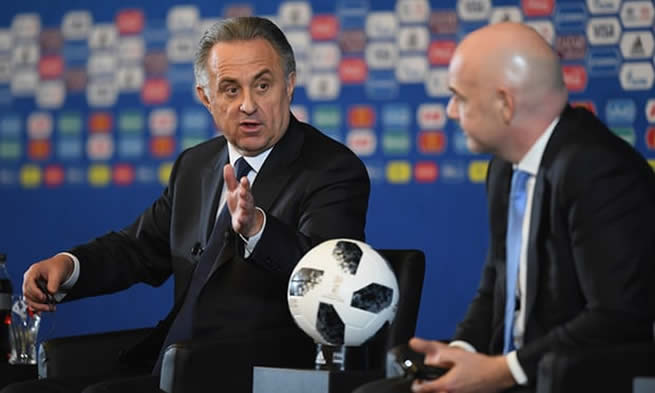For too long the International Olympic Committee has shown a strange reluctance to prosecute Russian doping. No matter how staggering the evidence, or loud the cries for justice, its president, Thomas Bach, has resisted sanctions. On Tuesday in Lausanne, however, the IOC finally had no choice but to act. The truth had at last overwhelmed its diffidence – and defences.
Vitaly Mutko claims there is ‘no proof’ of systematic doping in Russia
It came from the former president of Switzerland Samuel Schmid, who confirmed there had been “systemic manipulation” of anti-doping results at the Sochi Winter Olympics in 2014, and elsewhere, by the Russian state – and the evidence was not only extensive but “watertight”. Even Bach, a good friend of the Russia president, Vladimir Putin, felt compelled to call it an “unprecedented attack on the integrity of the Olympic Games and sport”.

By the time Bach, spoke the world knew of Russia’s punishment. Its Olympic Committee had been suspended from the Winter Games in Pyeongchang in February, and its deputy prime minister for sport, Vitaly Mutko, banned from the Olympics for life for his part in the deception. Meanwhile the Russian Olympic Committee was fined $15m (£11.2m) to reimburse the IOC’s costs and to improve the capacity and integrity of the global anti-doping system.
Given the breathtaking extent of their crimes, some will believe the punishments should have been deeper and the fines far steeper. Russia was, in effect, convicted of state-sponsored doping over a thousand athletes in 30 sports after all. Meanwhile Mutko somehow remains in charge of next year’s World Cup, which will be held in Russia.
Significantly the verdict was welcomed by anti-doping and athletes groups. Many of them recognised there was no perfect solution but were pleased the IOC had finally took firmer action. As Travis Tygart, the chief executive of the United States Anti-Doping Agency, put it: “Over the past three years, a high-stakes game of chicken has been played between those willing to sacrifice the Olympic ideals by employing a state-directed doping program to cheat to win and, on the other side, athletes unwilling to stand silent while their hopes and dreams were stolen and the Olympic Games hijacked. The IOC listened to those who matter most – and clean athletes won a significant victory.”
Russia was thrown a lifeline, though, with the IOC agreeing its athletes will get to compete in Pyeongchang – albeit under a neutral flag and with the words “Olympic athlete from Russia” on their jerseys, providing they can show they are not tainted by Mutko’s regime. That seems fair enough – this was always about justice not vengeance, and that applies to clean Russian athletes, too.
Russia banned from Winter Olympics over state-sponsored doping
Read more
However it was ironic the solution the IOC came up was nearly identical to that implemented by the International Association of Athletics Federations before the Rio Olympics. Seventeen months ago Bach had sniffed at its proposal. Now he embraced it. Bach explained this reversal by insisting a great deal had changed since the IOC waved through most of Russia’s athletes into the Rio Games. “At the time of Rio we had not the opportunity to follow due process,” he said. “And it was mainly about the failure of the Moscow laboratory – now it is about the manipulation of the Sochi laboratory.”
Such an explanation is clearly disingenuous. By May 2016 the world knew through Rodchenkov’s evidence that agents from Russia’s secret service, the FSB, had found out how to open the supposedly tamper-proof bottles used to collect urine from athletes and had switched samples that would have otherwise tested positive for steroids with clean ones in Sochi. Rodchenkov also claimed that at least 15 medal winners were involved.
Yes, most countries have a problem with doping but it was obvious long before Tuesday that Russia’s problem was unique in its scale and scope. The IOC was aware of it, too, but chose no |


